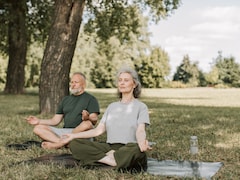Here are ten mental health strategies to stay calm and grounded during high-alert drills.

Tips To Maintain Mental Health During High-Alert Drills
On May 7, 2025, the Indian government initiated Operation Sindoor, a high-level mock drill across 244 districts amid rising tensions along the India-Pakistan border. While the drill is designed to enhance preparedness for emergencies, it can inadvertently impact the collective psyche of communities involved. The uncertainty, heightened security alerts, and repetitive news cycles can lead to stress, anxiety, and even panic. According to the World Health Organisation (WHO), managing mental health is critical during crises, both real and perceived. Here's how individuals, especially in districts undergoing drills, can take simple, practical steps to protect their mental health while staying informed and prepared.
Understanding the impact of high-alert drills on mental health
Situations like Operation Sindoor often evoke a ‘fight-or-flight' response in civilians. Continuous exposure to alert notifications, sirens, and military presence can increase cortisol (stress hormone) levels. According to WHO, chronic stress can weaken the immune system and worsen pre-existing mental conditions. Therefore, adopting calming habits, focusing on essentials, and limiting misinformation becomes essential to staying mentally resilient. Here are ten mental health strategies to stay calm and grounded during high-alert drills.
1. Stay informed, not overwhelmed
Rely on official government or health department updates instead of consuming every social media rumour. Set specific times to check the news. The WHO recommends information management as a key tool to reduce stress during crises.
2. Practice grounding techniques
Engage in deep breathing, progressive muscle relaxation, or the 5-4-3-2-1 technique to bring attention back to the present moment when anxiety peaks.
3. Maintain a basic daily routine
Even during mock drills or restricted movement, follow a consistent wake-sleep cycle, eat balanced meals, and avoid excessive caffeine or sugar. Routine restores a sense of normalcy.
4. Use community connection to feel supported
Whether online or offline, staying in touch with family and neighbours can ease feelings of isolation. Forming small safety check-in groups helps foster emotional safety.
5. Store healthy non-perishable foods
If stocking up is necessary, prioritise nutrition. Include whole-grain crackers, peanut butter, canned beans, dried fruits, nuts, and electrolyte-rich drinks. Healthy foods support mental well-being and physical strength.
6. Create a calming corner at home
Designate a quiet space with a few essentials: a book, torch, water bottle, prayer beads, or art supplies. This can serve as a comfort zone when needed.
7. Avoid excessive screen time during tension-filled periods
Spending too much time on phones or TVs can lead to ‘doomscrolling.' Schedule tech-free time, especially before bed, to improve sleep and mood regulation.
8. Keep emergency kits ready, but simple
Having essentials like medications, hygiene products, sanitary pads, and first aid not only aids in emergencies but provides mental reassurance.
9. Involve children with calm, age-appropriate explanations
Avoid discussing graphic content in front of children. Instead, explain drills as “practices for safety” using simple language. Provide comforting routines like storytelling or drawing.
10. Reach out to a mental health professional if needed
If feelings of helplessness, panic, or irritability persist, consult a certified psychologist. Many offer teleconsultation services today, even during alert phases.
Mock drills like Operation Sindoor are crucial for preparedness but can trigger emotional unrest among civilians, especially amid ongoing India-Pakistan tensions. By focusing on mental wellness strategies, practical routines, and reliable information, citizens can remain alert without succumbing to fear. As WHO states, “There is no health without mental health”, and that holds especially true in high-alert scenarios.
Disclaimer: This content including advice provides generic information only. It is in no way a substitute for a qualified medical opinion. Always consult a specialist or your own doctor for more information. NDTV does not claim responsibility for this information.
DoctorNDTV is the one stop site for all your health needs providing the most credible health information, health news and tips with expert advice on healthy living, diet plans, informative videos etc. You can get the most relevant and accurate info you need about health problems like diabetes, cancer, pregnancy, HIV and AIDS, weight loss and many other lifestyle diseases. We have a panel of over 350 experts who help us develop content by giving their valuable inputs and bringing to us the latest in the world of healthcare.














